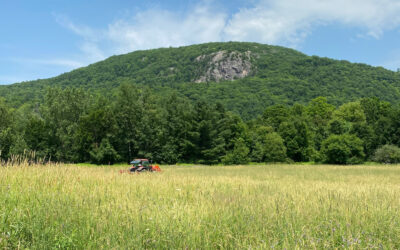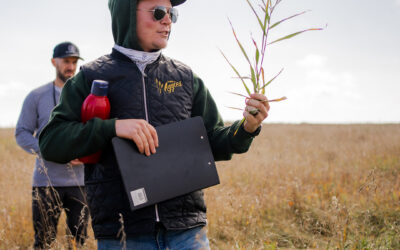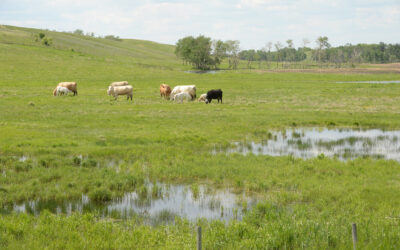“Prince Edward Island depends on the ecosystem services produced on our working landscapes,” says PEI ALUS participant Peter Townshend. “Through the ALUS program, we farmers are rewarded for our stewardship practices that go above and beyond any legislated measures.”
With their daughter Becky, Peter and Lynn Townshend grow potatoes, carrots and grain in Rollo Bay, Prince Edward Island.
Founded in 1974, the Townshend Potato Company is widely regarded as an early pioneer of engineered soil-conservation structures on PEI, having installed grassed waterways and berms as demonstration projects more than 30 years ago.
Townshend’s stewardship efforts have been recognized by the PEI Soil and Crop Improvement Association and the Government of PEI, through the Soil Conservationist of the Year Award and the Gilbert R. Clements Award for Excellence in Sustainable Agriculture.
He was also recognized at a special ceremony at Province House, the Prince Edward Island Legislature Building, when the PEI ALUS program launched in 2008 with Townshend as its first participant.
More than that, Townshend helped shape the ALUS program in its early stages, serving as a member of the program’s External Advisory Committee, now known as the Public Advisory Committee (PAC).
Today, the Townshends are proud to maintain many different ALUS projects on their farm, including soil conservation structures, grassed headlands, expanded buffer zones and the retirement of steeply sloped fields from cultivation.
All these ALUS projects help prevent erosion and keep sediment and agricultural inputs out of local streams and rivers, to help protect PEI’s water supply as a gift to future generations.
For example, the ALUS project pictured here is a small, streamside field that was formerly ploughed each year to grow annual crops like potatoes, carrots and grain. As a small piece of land, it was marginal in terms of productivity for the farm, making it a good candidate for an ALUS project.
The Townshends have now converted this area to perennial shrubs producing haskap berries, an antioxidant-rich “superfood” similar to blueberries. As there is no longer any need to disturb the soil or apply agricultural chemicals that could end up in the water, this ALUS project produces something beyond berries: cleaner water, a vital ecosystem service that benefits everyone.
“Agriculture is a tough business to be in,” says Townshend, “and we are thankful the Province of PEI is willing to share in the costs for stewardship on private agricultural lands. The ALUS program has allowed us to do some environmental things that we could not have afforded to do on our own.”



